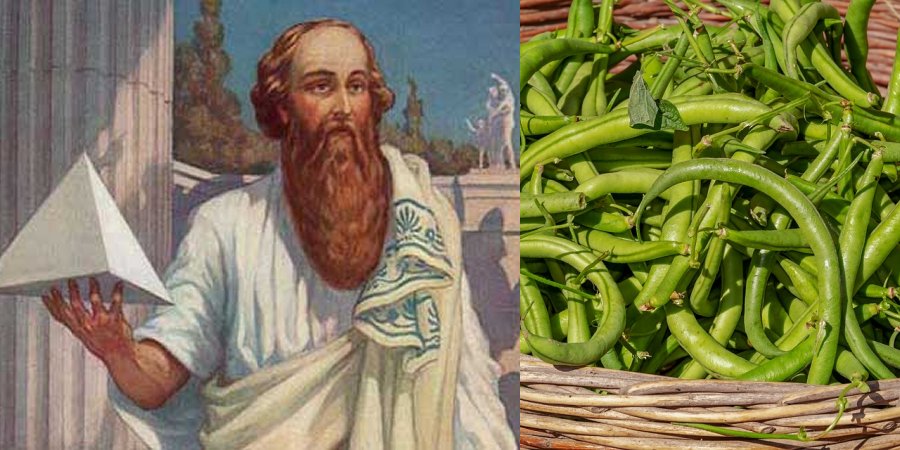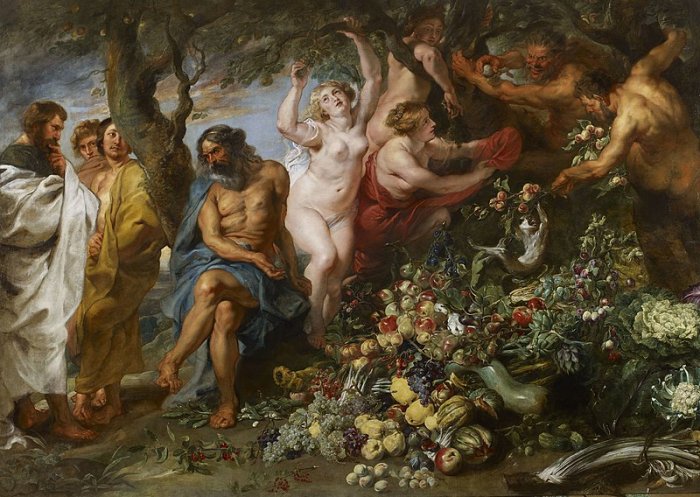Why Didn’t Pythagoras And His Followers Eat Beans?
Conny Waters - AncientPages.com - Pythagoras of Samos, an ancient Greek philosopher who made great contributions to mathematics and founded the Pythagorean School of Mathematics in Cortona, a Greek seaport in Southern Italy, was a vegetarian.
But did you know that Pythagoras abstained from meat and beans? Most vegetarians consume beans, but Pythagoras told his followers they mustn’t eat or even touch beans! Was Pythagoras worried about gastric problems, or did he have a deeper reason for omitting beans from the diet?
Left: Pythagoras. Credit: Famous Mathematicians. Right: Beans. Credit: Public Domain
The reason behind this is not entirely known, but there are certain theories that can provide some light on the great philosopher’s reluctance to beans.
Pythagoras believed that a person should strive for tranquility and peace. Beans were associated with metempsychosis, a philosophical term in the Greek language referring to the transmigration of the soul, especially its reincarnation after death. Pythagoreans believed that beans had the potential for life because they looked like human genitalia or fetuses.
Pythagoras conducted a scientific experiment demonstrating that humans and beans were spawned from the same source. He took some beans and buried them in the mud. They rested there for a few weeks before being removed and investigated by the great Greek philosopher. He concluded they looked like human fetuses.
Like ancient Egyptians, Greeks knew that fava beans could be deadly. Pliny wrote that followers of Pythagoras believed that fava beans were connected to Hades, the Greek God of the Dead, and the Underworld. The plants’ black-spotted flowers and hollow stems served as ladders for human souls and were associated with reincarnation.
Aristotle suggested that the bulbous shape of beans represented the entire universe, which was why beans shouldn’t be consumed.
Cicero proposed another explanation. In his book On Divination, he just wrote that he believed the Pythagoreans didn’t eat beans because they caused flatulence.
Pythagoras advocating vegetarianism. Painting made between 1618 and 1630. Credit: Public Domain
Another theory is that Pythagoras may not have had anything against beans at all. However, beans were used in ancient Greece as a ballot system. White beans represented a yes vote and black a no.
When Pythagoras said to his disciples, "Abstain from beans," he had no reference to them as an article of diet, for he ate them himself, but he advised his students not to get caught up in politics or government.
As H. L. Sumner points out, “what he did mean, and what his immediate followers already understood, was that they should abstain from the intrigues of politics as being antagonistic to a philosopher's pursuits.”
To put it in plain text – We do know that Pythagoras had disapproved of beans, but we simply don’t know what was behind his negative attitude.
Updated on November 24, 2023
Written by Conny Waters – AncientPages.com Staff Writer
Copyright © AncientPages.com All rights reserved. This material may not be published, broadcast, rewritten or redistributed in whole or part without the express written permission of AncientPages.com
Expand for referencesMore From Ancient Pages
-
 Ghostly Appearance Of Weird Ancient City Suspended In The Sky Witnessed By Many People
Ancient Mysteries | Jul 9, 2019
Ghostly Appearance Of Weird Ancient City Suspended In The Sky Witnessed By Many People
Ancient Mysteries | Jul 9, 2019 -
 ‘Exceptionally’ Rare Iron Age Axle Found In Suffolk
Archaeology | Jan 26, 2023
‘Exceptionally’ Rare Iron Age Axle Found In Suffolk
Archaeology | Jan 26, 2023 -
 Ancient Chinese Ingenuity Created Sophisticated Time Keeping Machines: Proof Of Remarkable Ancient Knowledge
Ancient Technology | Jan 14, 2019
Ancient Chinese Ingenuity Created Sophisticated Time Keeping Machines: Proof Of Remarkable Ancient Knowledge
Ancient Technology | Jan 14, 2019 -
 Tāne: Lord Of The Forest Who Brought Three Baskets Of Knowledge To People In Maori Mythology
Featured Stories | Feb 17, 2025
Tāne: Lord Of The Forest Who Brought Three Baskets Of Knowledge To People In Maori Mythology
Featured Stories | Feb 17, 2025 -
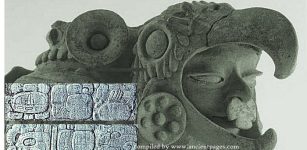 On This Day In History: Powerful Warlord And Emissary Of Spear-Thrower-Owl Arrived At Tikal – On Jan 8, 378 AD
News | Jan 8, 2017
On This Day In History: Powerful Warlord And Emissary Of Spear-Thrower-Owl Arrived At Tikal – On Jan 8, 378 AD
News | Jan 8, 2017 -
 Unexplained Phenomenon In Ancient Ireland – When Legends, Science And Real Events Collide
Ancient Mysteries | Apr 19, 2018
Unexplained Phenomenon In Ancient Ireland – When Legends, Science And Real Events Collide
Ancient Mysteries | Apr 19, 2018 -
 Rare Ancient Jawbone Of A Denisovan Who Lived 200,000 Years Ago Discovered In Taiwan
Evolution | Apr 14, 2025
Rare Ancient Jawbone Of A Denisovan Who Lived 200,000 Years Ago Discovered In Taiwan
Evolution | Apr 14, 2025 -
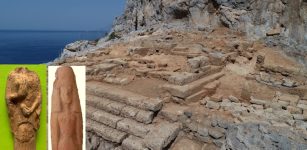 Secrets Of The Ancient Temple Of Dimitra At The Acropolis Of Falasarna Revealed By Archaeologists
Archaeology | Nov 19, 2022
Secrets Of The Ancient Temple Of Dimitra At The Acropolis Of Falasarna Revealed By Archaeologists
Archaeology | Nov 19, 2022 -
 First Peoples Of Japan: Ainu Civilization And Its Unknown Origin
Ancient Mysteries | Oct 18, 2014
First Peoples Of Japan: Ainu Civilization And Its Unknown Origin
Ancient Mysteries | Oct 18, 2014 -
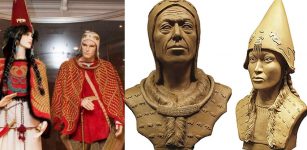 Stunning Facial Reconstruction Of ‘Siberian Tutankhamun’ And His ‘Queen’ Who Died 2,600 Years Ago
Archaeology | Jan 12, 2021
Stunning Facial Reconstruction Of ‘Siberian Tutankhamun’ And His ‘Queen’ Who Died 2,600 Years Ago
Archaeology | Jan 12, 2021 -
 Lady Trieu: Fierce Warrior, Rebel, Freedom Fighter And National Hero In Vietnam
Featured Stories | Feb 26, 2019
Lady Trieu: Fierce Warrior, Rebel, Freedom Fighter And National Hero In Vietnam
Featured Stories | Feb 26, 2019 -
 Buccaneers And Privateers Were Pirates – But What’s The Difference Between Them?
Ancient History Facts | Nov 5, 2016
Buccaneers And Privateers Were Pirates – But What’s The Difference Between Them?
Ancient History Facts | Nov 5, 2016 -
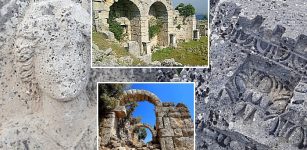 Excavations In Ancient City Of Cremna – One Of The Five Colonial Cities In Pisidia
Archaeology | Sep 26, 2023
Excavations In Ancient City Of Cremna – One Of The Five Colonial Cities In Pisidia
Archaeology | Sep 26, 2023 -
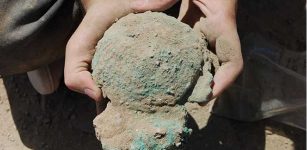 Rare Discovery Of 4,300-Year-Old Copper Ingots Left By Mistake In A Settlement In Oman
Archaeology | Jun 2, 2023
Rare Discovery Of 4,300-Year-Old Copper Ingots Left By Mistake In A Settlement In Oman
Archaeology | Jun 2, 2023 -
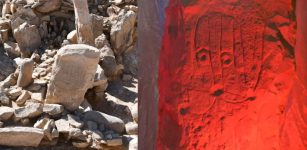 Unique 9,000-Year-Old Shrine With Symbols Discovered At Neolithic Ritual Site In Jordan Desert
Archaeology | Mar 7, 2022
Unique 9,000-Year-Old Shrine With Symbols Discovered At Neolithic Ritual Site In Jordan Desert
Archaeology | Mar 7, 2022 -
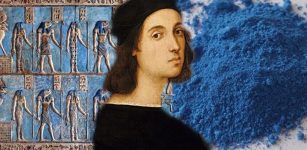 Fresco Reveals Renaissance Genius Raphael Used Egyptian Blue – World’s Oldest Artificial Pigment
News | Sep 8, 2020
Fresco Reveals Renaissance Genius Raphael Used Egyptian Blue – World’s Oldest Artificial Pigment
News | Sep 8, 2020 -
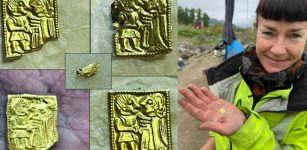 Mysterious Tiny 1,400-Year-Old Gold Foil Figures Found In Pagan Temple
Archaeology | Sep 23, 2023
Mysterious Tiny 1,400-Year-Old Gold Foil Figures Found In Pagan Temple
Archaeology | Sep 23, 2023 -
 Land of Israel: A 5,000-Year-Old Settlement And A Pottery Kiln Unearthed Near Beit Shemesh At The Site Of Hurvat Husham
Archaeology | Oct 30, 2024
Land of Israel: A 5,000-Year-Old Settlement And A Pottery Kiln Unearthed Near Beit Shemesh At The Site Of Hurvat Husham
Archaeology | Oct 30, 2024 -
 Atlatl Weapon Use By Prehistoric Females Equalized The Division Of Labor While Hunting – Study Shows
Archaeology | Aug 18, 2023
Atlatl Weapon Use By Prehistoric Females Equalized The Division Of Labor While Hunting – Study Shows
Archaeology | Aug 18, 2023 -
 Surprising Discovery Of Ancient Sarcophagus At Paris’ Notre Dame Cathedral
Archaeology | Mar 16, 2022
Surprising Discovery Of Ancient Sarcophagus At Paris’ Notre Dame Cathedral
Archaeology | Mar 16, 2022

